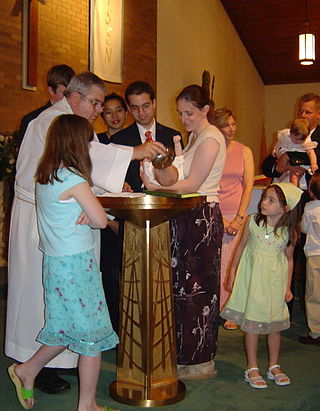
Infant baptism is the practice of baptising infants or young children. Infant baptism is also called christening by some faith traditions.

Thomas the Apostle, also known as Didymus, was one of the Twelve Apostles of Jesus according to the New Testament. Thomas is commonly known as "Doubting Thomas" because he initially doubted the resurrection of Jesus Christ when he was told of it ; he later confessed his faith on seeing the wounds left over from the crucifixion.
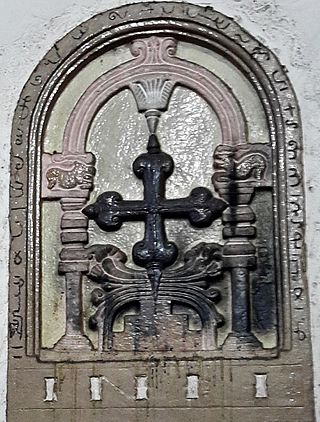
The Saint Thomas Christians, also called Syrian Christians of India, Marthoma Suriyani Nasrani, Malankara Nasrani, or Nasrani Mappila, are an ethno-religious community of Indian Christians in the state of Kerala, who, for the most part, employ the Eastern and Western liturgical rites of Syriac Christianity. They trace their origins to the evangelistic activity of Thomas the Apostle in the 1st century. The Saint Thomas Christians had been historically a part of the hierarchy of the Church of the East but are now divided into several different Eastern Catholic, Oriental Orthodox, Protestant, and independent bodies, each with their own liturgies and traditions. They are Malayalis and speak Malayalam. Nasrani or Nazarene is a Syriac term for Christians, who were among the first converts to Christianity in the Near East.

A saint's name, which is usually also a biblical name, is the name of a saint given to individuals at their baptism or confirmation within the Catholic Church, as well as in certain parts of the Eastern Orthodox Churches, the Oriental Orthodox Churches, Lutheran Churches and Anglican Communion. It is believed that the saint whose name is chosen will serve as a special patron to protect and guide and will be the heavenly intercessor for the individual who bears his or her name.

The Malankara Mar Thoma Syrian Church, often shortened to Mar Thoma Church, and known also as the Reformed Syrian Church and the Mar Thoma Syrian Church of Malabar, is an autonomous Reformed Oriental church based in Kerala, India. While continuing many of the Syriac high church practices, the church is reformed in its theology and doctrines. It employs a reformed variant of the West Syriac Rite Divine Liturgy of Saint James, translated to Malayalam.

Mathews Mar Athanasius (Mar Thoma XIII) (25 April 1818 – 16 July 1877) was the Malankara Metropolitan of the Malankara Church from 1852 until 1865. As a reformer, he spent most of his reign attempting to reform and heal rifts within the church. However in 1865, he was deposed by the traditionalist faction of the Malankara Church and Pulikkottil Joseph Dionysius became their leader.
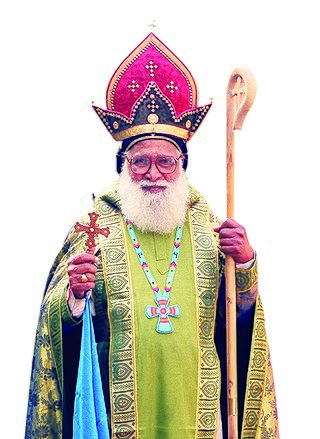
Philipose Mar Chrysostom Mar Thoma XX Valiya Metropolitan, was an Indian prelate who served as Metropolitan of the Malankara Mar Thoma Syrian Church from 1999-2007 and Valiya Thirumeni from 2007 until his death. He was the world's longest serving bishop, serving for −67 years, 11 months and 12 days. He was addressed and referred to as Chrysostom Thirumeni or Valiya Thirumeni after his retirement. He was awarded India's third highest civilian award, the Padma Bhushan, in 2018.

Alexander Mar Thoma XIX Metropolitan was the Metropolitan of the Malankara Mar Thoma Syrian Church with its center in Kerala state in south-western India.

Juhanon Mar Thoma XVIII Metropolitan was the Metropolitan of the Malankara Mar Thoma Syrian Church from 1949–1976, who gave leadership to the church and at the same time actively participated in social and political arenas. He was respected by people from all walks of life, from all religions and from all age groups. He is remembered for providing the church with its famous motto "Lighted to Lighten". His humanistic and socially-engaged approach to the Christian faith was embodied in his personal credo: "The Church must be interested where human life is interested."
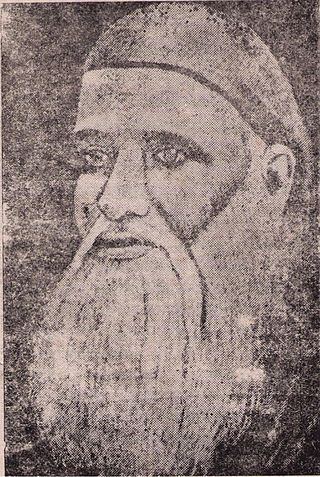
Palakunnathu Abraham Malpan, was an Indian cleric and theologian known for the Reformation movement within the Malankara Church during the 19th century. He was born in the ancient Syrian Christian Palakunnathu family which practiced West Syriac Rite Oriental Orthodoxy after the Coonan Cross Oath of 1653.

Abraham Mar Thoma XVII Metropolitan was the Metropolitan of the Malankara Mar Thoma Syrian Church from 1944–1947. He was called Maret Kochu Thirumeni by his people. Among the bishops of Malankara Churches Including Mar Thoma Church, Abraham Mar Thoma was the first to earn a Doctoral degree.

Titus II Mar Thoma Metropolitan (Mar Thoma XVI) (6 May 1866 – 6 July 1944) was the head of the Malankara Mar Thoma Syrian Church with its center in Kerala state in south-western India. He was known as Thithoos Dwitheeyan Mar Thoma Metropolitan among his people. (Thithoos is Aramaic and Malayalam)

Titus I Mar Thoma Metropolitan (Mar Thoma XV) (20 February 1843 – 20 October 1909) was known as Thithoos Mar Thoma Metropolitan (Thithoos is Aramaic and Malayalam) was the second Mar Thoma Metropolitan (1893–1909) after the Malankara Church split as the Orthodox and reformist factions.
Mar Thoma VII was a Bishop of the Malankara Church from 1796 and the 7th Malankara Metropolitan from April 1808 to July 1809. He was born in Pakalomattom family in Kurichithanam, Pala.He was well known as an efficient administrator, deeply religious but was a quiet and reserved person. During his time, a difficult period in the history of Travancore State, the church was able to help Travancore government by depositing an amount as fixed deposit, which came to be known as Vattipanam.
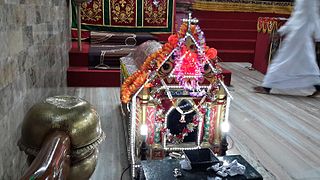
Mar Thoma IX was the ninth Metropolitan of the Malankara Church in Kerala, India for a brief period in 1816. That year, he was consecrated Metropolitan by Mar Thoma VIII, but soon after his ordination he was dethroned by Pulikkottil Joseph who was appointed by the then British resident Colonel John Munroe.
Mar Dionysius II, born Pulikkottil Joseph Ittoop was 10th Malankara Metropolitan for nine months until his death on 24 November 1816. He dethroned Mar Thoma IX and succeeded him by the favour of Col.John Munroe, then British Resident of Travancore. Despite the brevity of his reign he made lasting contributions to the Malankara Orthodox Syrian Church.

The Jacobite Syrian Christian Church (JSCC), or the Malankara Archdiocese of the Syrian Orthodox Church in India also known as Malankara Jacobite Syrian Orthodox Church, the Jacobite Syrian Church, and the Syriac Orthodox Church in India, is a catholicate based in Kerala, India, of the Syriac Orthodox Church of Antioch and part of the Oriental Orthodox Church. It recognizes the Syriac Orthodox Patriarch of Antioch and All the East as supreme head of the church. It functions autonomously within the church, administered by the Metropolitan Trustee, under the authority of the Maphrian of India, Baselios Thomas I. Following schism with the Malankara Orthodox Syrian Church, is currently the only church in Malankara that is directly under a Syriac Christian Antiochian hierarchy, claiming continuity to the 1665 schism. The church employs the West Syriac Rite Liturgy of Saint James.
Mar Thoma IV was the 4th Malankara Metropolitan of the Malankara Church in India, serving from 1688–1728. During his tenure, the church was subject to a number of persecutions.
Oommen is a name used by Syrian Christians (Nasranis) of India, especially in Kerala, the Southwestern state of India.

The Saint Thomas Christian denominations are Christian denominations from Kerala, India, which traditionally trace their ultimate origins to the evangelistic activity of Thomas the Apostle in the 1st century. They are also known as "Nasranis" as well. The Syriac term "Nasrani" is still used by St. Thomas Christians in Kerala.













